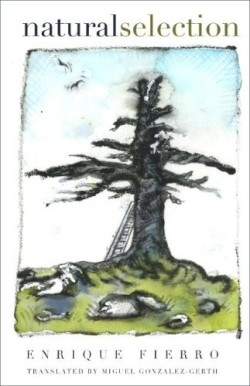
Natural Selection
Any poem whose significance resides only in its “meaning” will suffer from a widely unrecognized, and even less widely acknowledged, truth. The same facts, both emotional and experiential, might have been shared in an infinite number of different words by an infinite number of other poets.
The voice to be discovered in this small offering is a distillation of forty years’ work by Uruguayan poet Fierro. There’s no question that both his gift and his style are unique. In the introduction, his poetry is described as “an impersonal creation, an abstract manifestation of existence where even the self tends to disappear.” In every poem, this tendency toward the abstract and away from the concrete lends a sense of displacement, even to the point of a bewildering multiplicity of meaning that can cause the reader to wonder just what this poem is actually about. The fascinating thing about that question in this particular instance is: that’s just the point. The poem’s uniqueness resides precisely only in its “isness.”
As an example, here’s a completely “literal” translation of one of the simpler pieces: “April // What doesn’t fall / in the air / interminable: / the word / that says that (what) it says?”
Probably before this question (these questions?) can be answered, they must be first interpreted. Why April? A parade of additional questions will no doubt follow in the reader’s mind. Is it the air that is interminable, or that which falls? Or doesn’t fall? And is it the word that doesn’t fall? Or is it the word that is interminable? The word translated here as either “that” or “what” can signify either or both in Spanish. In any event, here’s a poem that must be more deeply understood than a mere superficial reading allows. No one of those infinite other poets can even approach it with a potential paraphrase. The poem itself, without meddling, is already three poems, maybe more.
The translations will be useful to those who have no Spanish, but readers fluent in Spanish will find considerable extra enjoyment by pondering the originals. The poetic utterance in these verses is so persistently ambiguous that probably no translator with only one version can do them justice. Even these scrupulous translations by Miguel Gonzalez-Gerth, who is fluent in the original language as well as in English, struggle with meaning. Perhaps there’s no such thing as a translator intrepid enough to take the same kind of chances with a reader that these originals demand. It’s as though Fierro, with an almost priestly reverence for his own language, refuses to gloss a poem even for the sake of clarity. As he says, the word says what it says. Who dares argue with that?
Reviewed by
Sandy McKinney
Disclosure: This article is not an endorsement, but a review. The publisher of this book provided free copies of the book to have their book reviewed by a professional reviewer. No fee was paid by the publisher for this review. Foreword Reviews only recommends books that we love. Foreword Magazine, Inc. is disclosing this in accordance with the Federal Trade Commission’s 16 CFR, Part 255.
